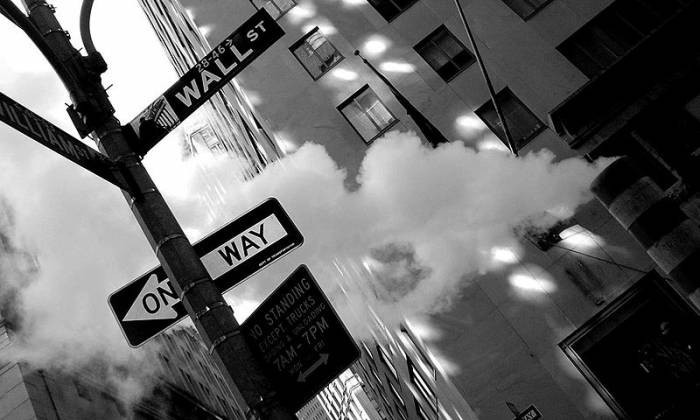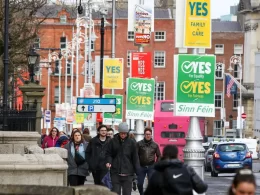By Manus Lenihan
Covid-19 has utterly changed the political landscape. Just one month ago, rent freezes were deemed “unconstitutional.” Today a rent freeze is in force, along with a ban on evictions. The healthcare system has been massively expanded. Private hospital beds and facilities have been (temporarily) taken into the public system. Billions have been dedicated to increasing unemployment benefits.
In country after country, nationalisations have taken place. “The sight of a Conservative UK chancellor last week launching policy measures that would once only have been found in the manifestos of revolutionary socialist parties raises all sorts of profound questions.” (Chris Johns, Irish Times, 22 Mar).
“Free market” gospel in tatters
For decades, the political establishment have insisted on degrading the public sector and handing over more and more of our services to “the free market.” Now, in the context of the Covid-19 disaster, the same politicians are, by their own actions, debunking the gospel of the neoliberal market. Yesterday, Simon Harris said, “There can be no room for public versus private when it comes to pandemic.” The crisis has forced him to admit that a one-tier public health system is the most effective way to provide care. But if a two-tier health system is not good enough now, why was it ever considered good enough?
Such measures, based on public intervention to defend the collective good, don’t just debunk neoliberalism. They vindicate socialist ideas. They point to the fact that in order to fight Covid-19 and to guarantee public health, we need to go a lot further, planning the economy democratically for human need, rather than profit, and taking into public ownership the massive wealth that exists in society.
But why are right-wing politicians taking such measures? In 2008, the banks were nationalised, not because those in power were converted to socialism, but so as to bail out the capitalist system at great cost to the public. Now in 2020, the Fine Gael caretaker government have advanced radical measures because, in the context of the Covid-19 crisis, anything less would undermine the whole system.
A “free market” response to this pandemic would obviously be a nightmare: people paying the market rate for tests, con artists hawking snake-oil vaccines and treatments to desperate people, workers laid off with no safety net, crowded spaces remaining open, a snowballing of bankruptcies and panics. That would be a complete disaster for everyone, including the ruling class.
Capitalism and the pandemic
But for working people, that nightmare is all-too familiar and too close to the reality. There are many measures that capitalist governments, unwilling to step on the toes of big business, have delayed or refused to take. Supposed “shut-downs” have left massive, crowded non-essential workplaces still up and running so as not to cut across profits. The production of treatments and protective equipment remains in the hands of private businesses. While ministers moan about the financial cost, the €15 billion tax bill from Apple is untouched because they don’t want to offend a private corporation.
Student nurses are saving lives, unpaid. Patients wait eight, nine, ten days for tests because our public health service has been underfunded and undermined for decades. Homeless people and refugees try to practise social distancing in cramped conditions; meanwhile, a few kilometres away, sit hundreds of luxury apartments that have been empty since the day they were built.
Boris Johnson’s first instinct was to be utterly blasé and laissez-faire in the face of the coronavirus, doing untold damage before his u-turn. But even now there is no compulsion on most businesses to close. Meanwhile, in the US, Trump has been pouring $1 trillion per day into the stock market, with far smaller sums for healthcare. The development and production of vaccines and treatments, funded by shovelfuls of public money, is in the hands of profiteers, and big pharma bosses salivate at the prospect of selling dramatically overpriced products to desperate patients and health systems.
Clearly, workers need to take matters into their own hands, walking out and refusing to put our lives at risk for their profits. We need a workers’ shutdown. Strike action along these lines has taken place in Italy and elsewhere.
Covid-19 proves that workers are the real “wealth creators” in society; look what happens when we stay at home. The capitalist class, on the other hand, has proved fragile. Without massive public intervention and public funds, countless businesses would have gone bust. What happened to the robust and efficient capitalist system? What happened to all the rugged and fearless innovators and entrepreneurs? Two weeks of social distancing, and they are on their knees.
Breaking with capitalism
In contrast to the United States just a few miles away, where the virus is spreading like wildfire, Cuba at the time of writing has 48 confirmed cases and one fatality, who it appears caught the virus in Italy. Doctors from Cuba are being sent around the world to combat the pandemic, while various countries, including Ireland, are looking at Cuban drugs and potential vaccines for Covid-19. All this is doubly impressive because Cuba’s relatively old population and reliance on tourism as a result of a 60 year blockade by US imperialism make it more vulnerable to Covid-19, not less.
Cuba is not a genuine socialist regime, it is politically ruled by a bureaucracy that is privileged, unaccountable and un-elected, which is increasingly looking towards the capitalist market as a way to run society. Notwithstanding the absence of democratic working-class control of the economy and state, whose critical input is crucial to building a socialist society, the economy is still based on state ownership and planning of the key sectors of the economy, as opposed to being run in the short-term interests of private profit. This has enabled it to free up its resources to build one of the best public health services in the world. It is a glimpse of what is possible when the capitalist system is abolished, as happened in the aftermath of the Cuban Revolution in 1959.
Democratic public ownership and planning on an international basis, clearly, would yield even greater benefits to humanity. On this basis, the vast wealth and technology of society that is currently in the hands of the capitalist class – big business, private bankers, the financial markets and the super-rich – would be utilised in a rational and democratic manner. We could invest in top quality public services, such as health care.
We could abolish the waste of the competition between capitalist companies and states, in the form of the duplication of goods and research and development (as exists in big pharma), advertising and the arms industry. We could safeguard our environment and justly transition to a zero-carbon economy by investing in green jobs, renewable energy and free public transport. We could release the talents and capabilities of working class people and allow them to run society, as opposed to representatives of capitalism, whose criminal misrule has wreaked havoc on society.
We shouldn’t go back
Varadkar and Co are already warning us that there will be a huge bill to pay as a result of this crisis. They have made big concessions, vindicating the failure of their system, but as soon as they deem this crisis to be over, they intend to claw back those concessions with interest. People should refuse to accept a return to the neoliberal status quo, which would place us abjectly at the mercy of climate disasters or the next pandemic.
Instead, we should fight to build a socialist alternative and a movement of all working-class people that ends the rule of the so-called “masters of the universe”, a capitalist class whose rule has long outlived its usefulness to humanity.












